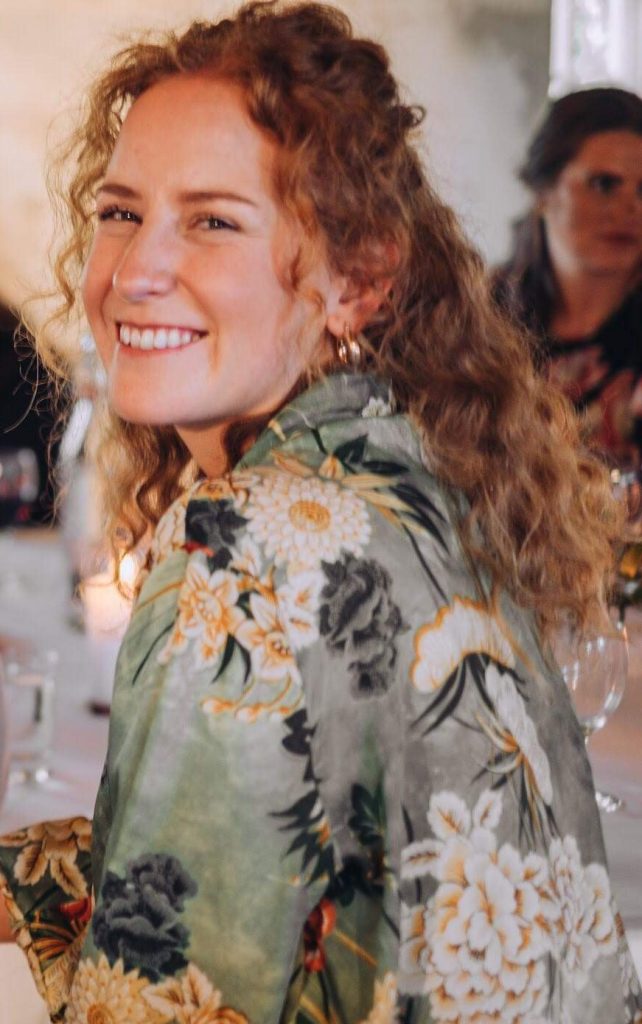Two pieces of paper from a calendar
Twelfth of May Fifth of October
Small comb of lusterless metal
Blue embroidered letters on linen fabric: Jesus
Brown photograph of a woman with a big mouth
For Anne from Hege
Spoon with dark lines
When I walk down the steep stairway, mild air on my skin. A weak sound
escapes the wood with each step.
Out there eyes are being filled with pale sun. I lean against the wall, and feel
blood pulsing in my palms. My blood, an even weak rhythm.
March, snow is wet.
Light is all around the grey corners of the house.
On the white painted wall the image of his suffering.
The cross, strangely shining and beautiful. A smooth tree without branches,
above thunderclouds are hanging low.
His neck is deeply bent, that neck with young frizzy hair. I can’t
see the face. Red drops are dripping under the thorns.
Free us. Free us. Shatter all shiny weapons. Give the men clean hands.
Many children are not yet born. Thunderclouds hang low, almost black.
This is my Body. Four nails through the feet,
pounded in between bare tendons. Blood in purple stripes,
dried against the thin side of the upper body.
I’m thirsting
By the foot of the cross a woman with eyes transfixed,
one arm reaching out with the hand open.
Maria. Maria. I know you can’t see him.
I know you feel the nails in your flesh.
In the evening light his naked chest shines yellow.
Behind the split curtain a mumbling
of rusty knives.
They say I have to leave. They turn away, and say I will be
well. They say rest, clear, pure air, sunshine, white beds, help, medicine,
invigorating baths.
They say it will be good. Soon.
They pack clothing in a box, they come to get me, keep me steady, help me
into the carriage. They drive me off. Early morning, they stand there
and watch me leave.
April morning. I let my head fall back
and hold on tight to the seat. I’m going away.
Every morning get up from bed. Walk across the floor to the table, to
the mirror. Six steps forward. This is important. Six steps.
Smell of lye when I lift the soap. Pitcher of water, little bubbles of
air against its inside.
Feel face wet, skin trembling against water, some enter the mouth.
The pitcher has been standing here in the night while I was sleeping,
water is lukewarm.
Hair is straight and dull now. A crackling sound under the comb
when I sort it out. Don’t look into the mirror much, don’t see the
face too clearly.
I know anyway.
Cling tight to this morning, hold on.
Copyright 1968 by Paal-Helge Haugen. English Translation Copyright 2019 by Julia Johanne Tolo. Published with permission from Hanging Loose Press, publisher of the English translation of Anne in 2019.
Paal-Helge Haugen (b. 1945 in Setesdal, Norway) has published over 30 books (poetry, fiction, children’s books, plays, essays) and books or selections of his work are translated to some 20 languages. He considers himself primarily a poet. He has received all the major Norwegian literary prizes, in addition to the Dobloug Prize, awarded by the Swedish Academy, The Richard Wilbur Prize (USA) and ‘Edvard’ (The Grieg Prize) for texts to music. Haugen has collaborated extensively with visual artists in Norway and Germany, and has written the libretti for six operas and other large-scale works by Norwegian composers, including Arne Nordheim and Cecilie Ore. He has also collaborated with experimental jazz musicians in Europe, among others David Sylvian and Arve Henriksen. In 2008 he was made Knight 1st Grade of The Royal Norwegian Order of St. Olaf, in recognition of his services to Norwegian art and letters. His titles in English include Stone Fences (University of Missouri Press, 1986), Wintering with the Light (Sun and Moon Press, 1997), and Meditations on George de la Tour (Bookthug, 2013).

Julia Johanne Tolo is a poet and translator currently based in Oslo. Her most recent work includes a collaborative chapbook, The Day, made with visual artist Jenni Wu (Bottlecap Press, 2022), and mother/cake, a chapbook of poems, prose, and drawings (Ghostbird Press, 2021). Her translation of Paal-Helge Haugen’s Anne won the 2018 Loose Translations Prize and was published by Hanging Loose Press in 2019.
“Our idea in calling this the ‘Translator’s Page’ is to show the ways and/or languages in which a translator works. Monthly posts may include translations from different languages and styles and centuries. The connective thread between them is the ability of the translator to interpret cultures and time periods for the contemporary reader.”
—Jonathan Wells, curator of The Translator’s Page